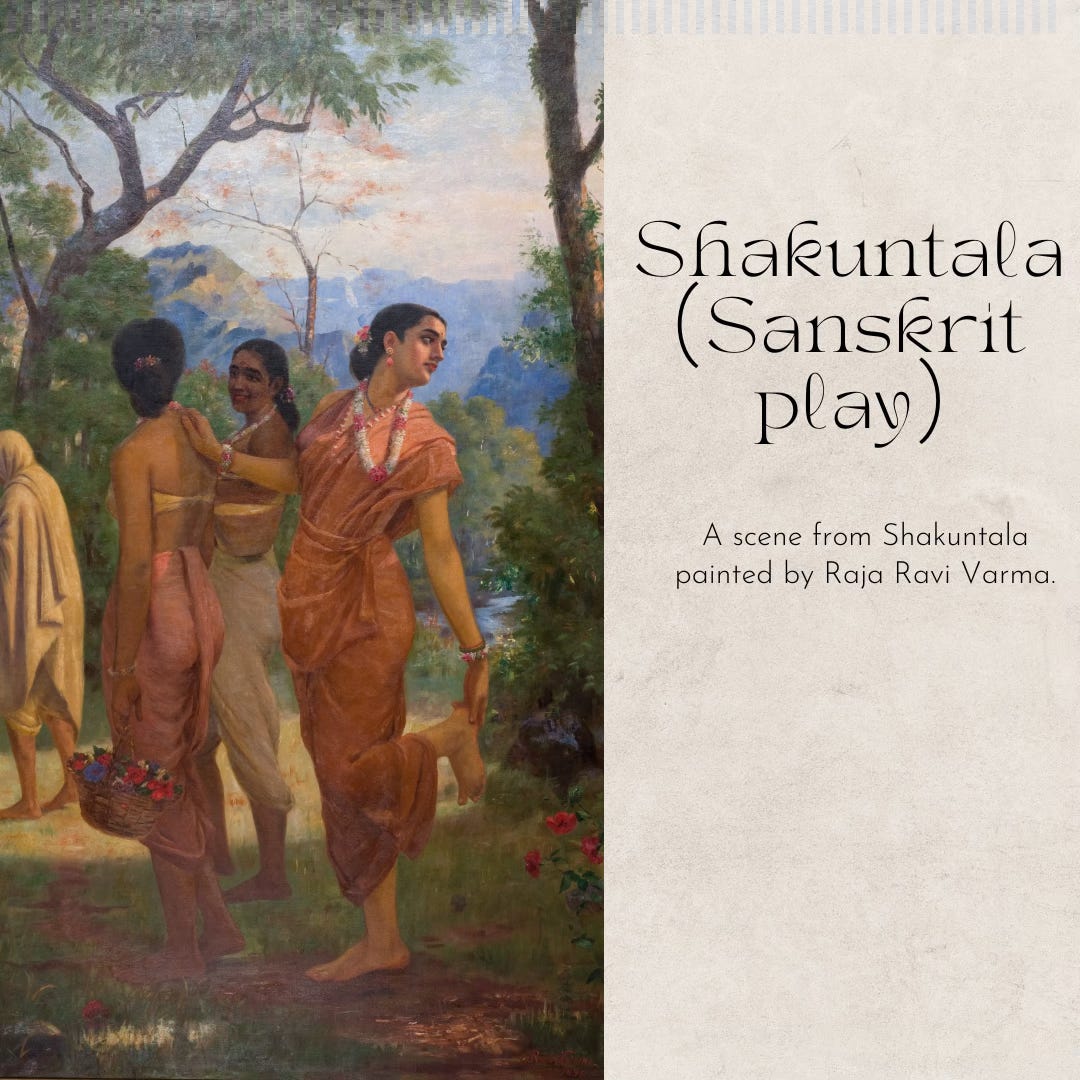📜Ek Mehfooz Manzil Kahaniyon Ki – Shakuntala by Kalidasa
मेघस्यास्मिन्नतिनिपुणता बुद्धिभावः कवीनां नत्वार्यायाश्चरणकमलं कालिदासश्चकार (Now roam wherever you please in your glory, and may you not suffer even a moment apart from the light of your life.)
Crafted with care, just for you.
The Origins of Kalidasa Plays
Kalidasa wrote several types of plays, the most famous being Abhijnanashakuntalam (The Recognition of Shakuntala), Malavikagnimitram (Malavika and Agnimitra), and Vikramorvashiyam (Urvashi Won by Valor). These plays are notable for their lyrical quality, poetic dialogue, and deep exploration of emotions.
Among them, Abhijñānaśākuntalam ("Of the recognition of Śakuntalā") is generally regarded as a masterpiece. It was among the first Sanskrit works to be translated into English, and has since been translated into many language
Abhijñānaśākuntalam (Of the recognition of Śakuntalā)
King Dushyanta is chasing a deer in his chariot when a hermit stops him, explaining that the deer belongs to a protected hermitage. The hermit invites Dushyanta to visit, mentioning that the sage Kanva is away but his daughter Shakuntala is there. Dushyanta enters the hermitage and secretly watches Shakuntala and her friends, Anasuya and Priyamvada. When a bee troubles Shakuntala, Duhshanta leaves his hiding place, but does not reveal that he is the king, though he gives to Shakuntala a ring that suggests his identity. The king’s soldiers disturb the hermitage and he leaves to draw them away. King Duhshanta, having revealed his identity, stays at the hermitage and secretly observes Shakuntala and her friends, as they discuss matters of romance. It becomes clear to him that Shakuntala is in love with him. When Shakuntala recites a love poem expressing her feelings, the king steps out from his hiding place and openly declares his love for her. Their mutual declarations effectively constitute a secret marriage. and soon after, Shakuntala becomes pregnant.
When the sage Durvasas arrives at the hermitage, Shakuntala, preoccupied with thoughts of her lover, inadvertently neglects to greet him properly. Angered by this, Durvasas curses her, declaring that her lover, King Dushyanta, will forget her entirely. However, when Priyamvada pleads with the sage to reconsider, he relents slightly, allowing that the king's memory will be restored if he sees the signet ring he gave to Shakuntala. Following this, Shakuntala prepares to leave the hermitage and journey to the king’s palace, with emotions running high as she departs.
King Dushyanta is surprised and uneasy when he receives news of an approaching party from Kanva’s hermitage. When Shakuntala arrives, she informs the king that she is pregnant and asks to be accepted as his wife. However, the king, having forgotten her entirely, denies any connection with her. Shakuntala tries to present the signet ring as proof, but realizes it has gone missing. Confused and defensive, the king accuses her of deception. Despite this, a court priest suggests allowing Shakuntala to stay until she gives birth to the child. Dusyanta eventually agrees to shelter Shakuntala until she gives birth, but before he can act on this decision, Shakuntala is spirited away to the celestial realm by nymphs.
A poor fisherman finds the King's signet ring inside a fish and is threatened with execution, but the King, recognizing the ring and recalling everything, confirms his story and rewards him. Shortly after, Sanumati, a nymph and friend of Shakuntala's mother, secretly observes the palace to discover why the spring festival has been canceled. She learns that the King, consumed by depression and guilt over Shakuntala, has called off the celebration. King Dushyanta remains fixated on the situation until Matali, the charioteer of the god Indra, arrives at the palace and takes him on an urgent mission to battle demons.
Six years go by. King Dushyanta, having defeated the demons, is honored by Indra. While touring the earth in a flying chariot with Matali, they descend to Marica’s hermitage. There, the King is amazed to encounter a young boy who bears a striking resemblance to him. When he picks up the boy’s protective amulet—something only the boy and his parents can touch—he realizes that the child is indeed his son and the foretold ruler of the world. Shakuntala then appears, and although it takes her a moment to recognize the King, they soon reunite with tears of joy. The three of them speak with the sage Marica, who explains Durvasa’s curse and advises the couple not to blame themselves or each other. Marica confirms child destiny, blesses the family, and sends them back to live in Dushyanta’s court.
Through his masterful storytelling, Kalidasa takes the reader on a journey through the mystical forests and grand palaces of ancient India, immersing them in a world where love and destiny intertwine in the most beautiful of ways.
Our newsletter is evolving into a safe space where you can sit back and truly enjoy the art of storytelling. In this world full of distractions, we want to offer you a clutter-free space where stories can unfold at their own pace, with all the richness and depth they deserve.
We believe that stories matter. They are a reflection of our shared humanity, and through them, we can explore, understand, and connect with each other in profound ways.
So, join us on this journey. Let Bohemian Dialogue be the place where you find stories that touch your heart and transport you to new worlds. This is your safe space, your haven, your Bohemian Dialogue.



